
AWARD CEREMONY
CIVIS Media Prize 2021
There are beaming winners, valuable prizes and impressive contenders for one of the CIVIS Awards. There is jubilation, tearful emotion and a lot of applause. The latter is delivered by the nominees themselves because, due to Corona restrictions, no live auditorium can be admitted to the WDR studio in Bocklemünd, a Cologne suburb. It is the 34th time, that outstanding media productions on migration, integration and cultural diversity are awarded the coveted CIVIS prize, and pandemic rules still apply. But the annual gala has reclaimed its traditional spring date and host Jaafar Abdel Karim is presenting it with as much verve as if he was addressing a studio packed to the rafters.
CIVIS is moving on despite a tougher climate in society. CIVIS is needed, especially when the going gets tougher. Annette Widmann-Mauz, the Federal Commissioner for Integration, makes the point in a video message by CIVIS friends and partners: „Social cohesion is put to the test by the pandemic“. ORF Director-General Alexander Wrabetz agrees: „It’s important to have an award focussing on the issues of solidarity and social cohesion.“ CIVIS adresses those issues particularly when they come under pressure. „The fight againt racism and prejudice and for a more coherent society is always a current issue – this is not a question of changing fashion“, WDR Director-General Tom Buhrow declares.
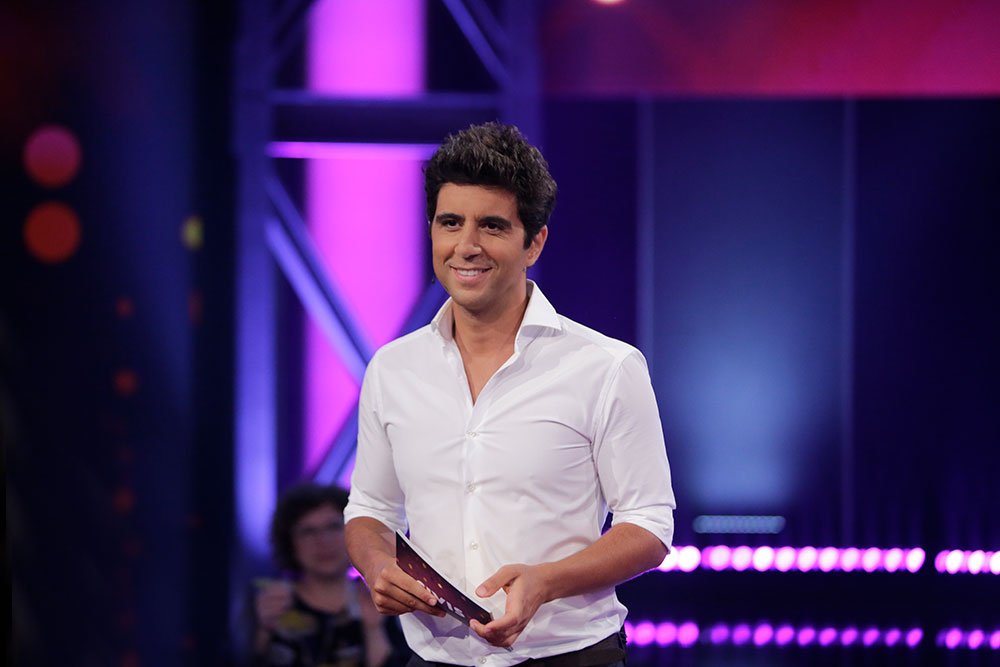
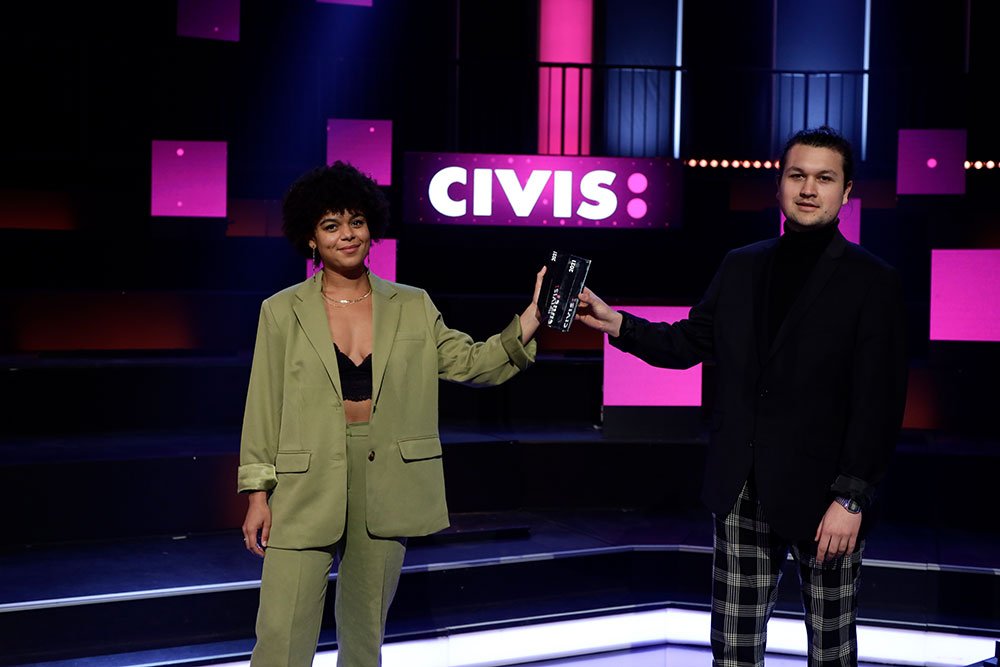
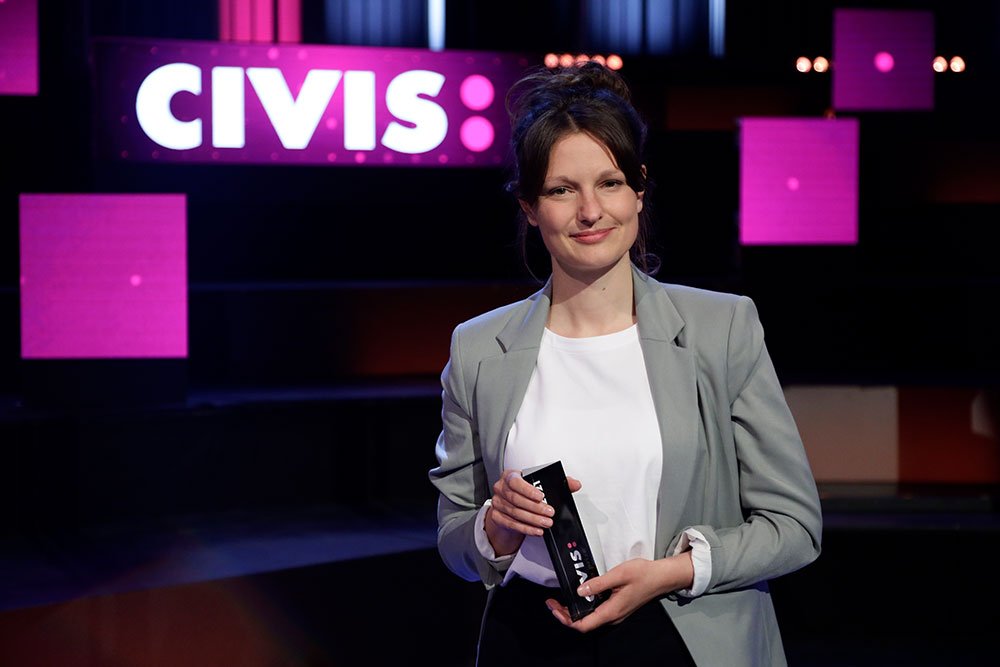
Cohesion is a long-time task
Over recent weeks and months, racist and anti-semitic assaults have demonstrated with unfettered brutality: Engaging for people with different backgrounds or religion living together in peace is not a short-term job. It is a permanent task. And the commitment to it has not been diminished by the pandemic. Close to 800 programmes – television, radio, internet – from 20 EU countries and Switzerland have competed for one of the CIVIS Media Awards. And again, not only did they deal with a multitude of problems faced by migration society but made clear as well how much we all stand to gain through diversity.
Take for instance the lesson to be learned by „May I Touch Your Hair?“ („Darf ich dir in die Haare fassen?“), winner in the Video Social Media category: Racism sometimes begins earlier than you think. Black people and People of Colour often meet somebody who feels free to touch and tussle their hair. Just like that. Just like that? The WDR Cosmo team has turned the table and asked passers-by would they mind having their hair tussled by a stranger? And – surprise! – some of them did, feeling a little awkward anyway. It is a provocation with a message. Actress Collien Ulmen-Fernandes, in her screened presentation of the video, has this to say: „The film makes clear why this gesture is a transgression, an element of everyday racism.“ Thus, the video promotes an insight considered important by Andreas Freudenberg, head of the Freudenberg Foundation’s Board of Trustees: „Community spirit will only develop through continuous efforts for a country’s political and social cultures.“
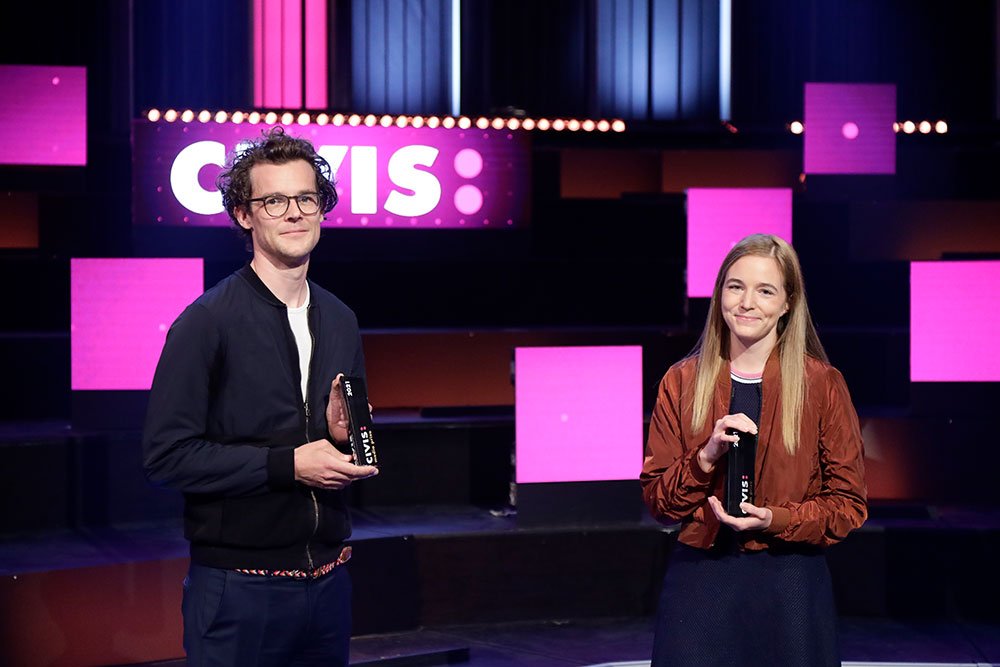
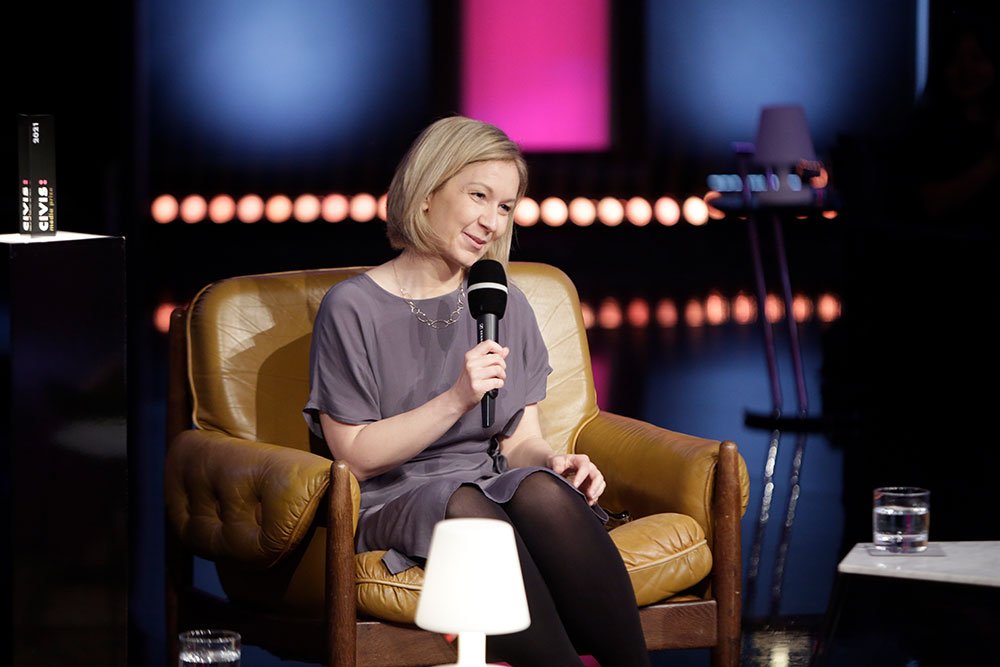
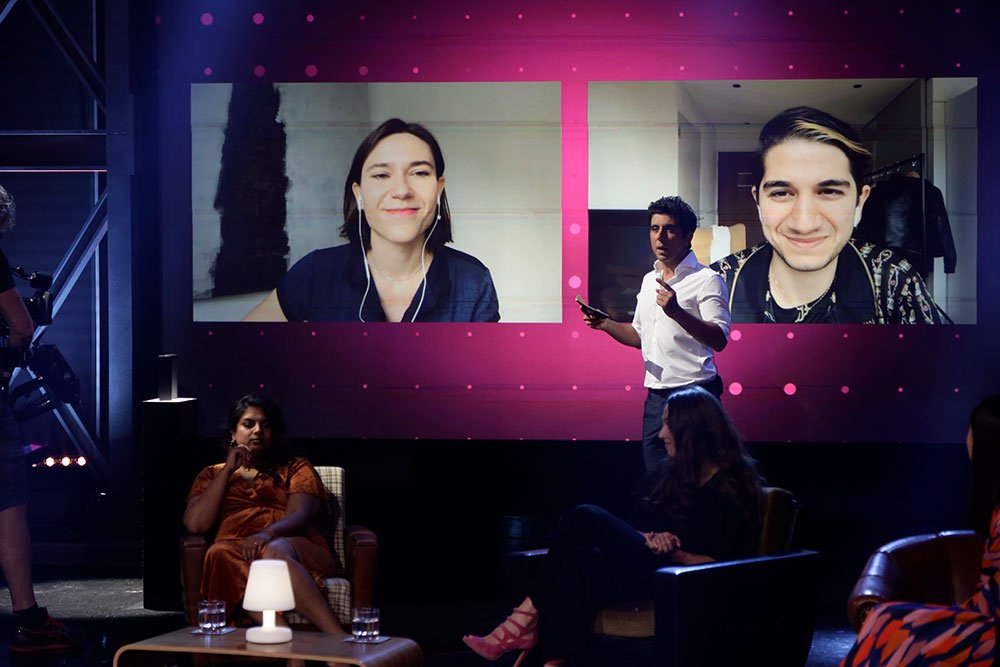
Courage, skill and tenacity pay off
A concrete lesson learned is behind the film „Seahorse“ („Seepferdchen“), director Nele Dehnenkamp’s winner of the YOUNG C. AWARD: „Many migrants can’t swim.“ Hannan, a Yesidi girl, had to learn it as well. Now she is teaching it to her brother and other children. Because swimming is important – it is life-saving. For Hannan, water is a dream and a nightmare at the same time, a constant reminder of her crossing of the Mediterranean in a dinghi. The haunting images are with her still. And yet, says actress Maryam Zaree in her presentation, „this wonderful film shows how to finally face your fears“.
Clearly, the investigative champion among this year’s contenders is „Rightwing. German. Radical“ („Rechts. Deutsch. Radikal“), winner in the Video – Information category. Following one and a half years of investigative research, Thilo Mischke and Anja Buwert offer a disturbing but instructive view of Germany’s ugliest face, a close-up of Nazis and those aspiring to become Nazis. Brown-shirt coziness, fanatical racism and open brutality come to the fore. „It takes courage, skill and tenacity – and that paid off!“, says presenter Wolfang Niedecken, founder of the legendary Cologne rock band BAP. „It is a fascinating portrayal of the many facets of Germany’s right-wing scene.“ Mischke’s and Buwert’s team is particularly proud of strong interest in their film shown by schools – „surely the most rewarding feed-back of all!“
Ignorance and xenophobia are also at the centre of Claudi Gschweitl’s radio report „Welcome to Weikendorf“ („Willkommen in Weikendorf“), which carries another of the 2,000 euro prizes, in the AUDIO LANG category. In Weikendorf, a village in Lower Austria, a family from Palestine wants to buy a house. The mayor objects, a citizens’ initiative confronts the unwanted immigrants, the escalating conflict shakes the whole community. People don’t talk to each other any more. It could just as well happen anywhere else in Austria, says Gschweitl. Bestselling author Frank Schätzing, in his laudatory address, agrees: „It is a lesson on racism that reaches far beyond Weikendorf.“
Everyday life stories
The CIVIS-winner in the cinema category is again chosen not by a jury but by popular vote. „Future Three“ („Futur Drei“) is the story of young Parvis whose family has come from Iran. Now he is searching for his identity in Germany. „I have to make my own experiences“, he tells his mother, who is still dreaming of Tehran. He makes them in a home for refugees, in a gay club, in his parents’ traditional household, in the streets at night or in the countryside. He meets Banafshe, whom the authorities want to send back to Iran, and he meets her brother, with whom he falls in love.
Director Faraz Shariat has refrained from shooting a heavy problem-laden film, actor Christoph Maria Herbst says in his laudatory message. „This is about the lives of young people – and narrated in the words, images and the language of yound people“. Thus, it meets what film producer and CIVIS partner Minu Barati (Produzentenallianz) wishes for: „More normality for future generations of the children of migrants. They are no aliens!“ And what about „Future Three“, the enigmatic title, studio host Jaafar Abdul Karim asks the producer. Paulina Lorenz: „Because this ist about the future … three people’s utopia.“
„Gentlemen“ („Herren“), the winning film in the VIDEO Unterhaltung category, is all about the present. It is an everyday life story – black people’s everday life in Germany, that is. Sure enough, they are confronted with discrimination, prejudice and resentment regularly. But their life is about more than that. Ambition, family strife, ageing play an important part as well. That can add up to „a normal male midlife crisis“, says script writer Stefanie Kremser. It took ten years to produce a film that is a premiere of a special kind. Actress Annette Frier explains in her presentation: All actors are black – „you have never seen that on prime-time ARD television!“
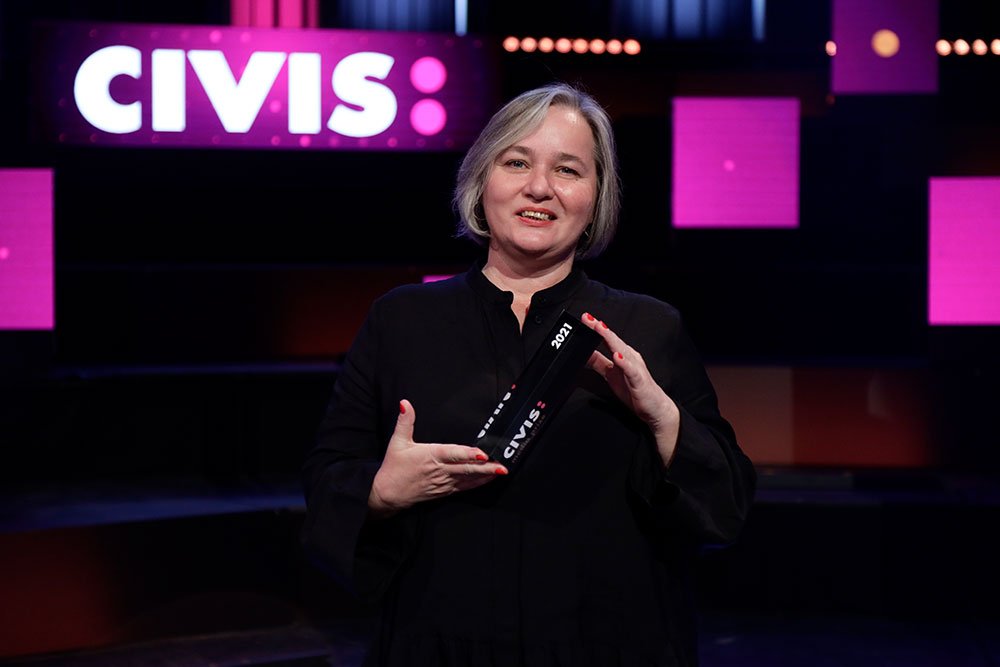
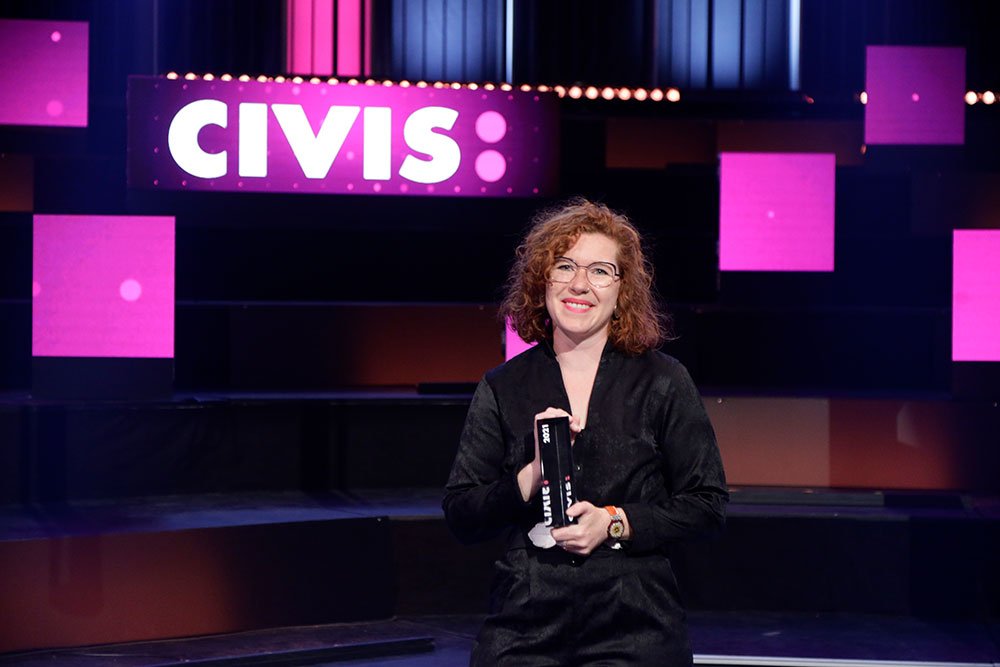
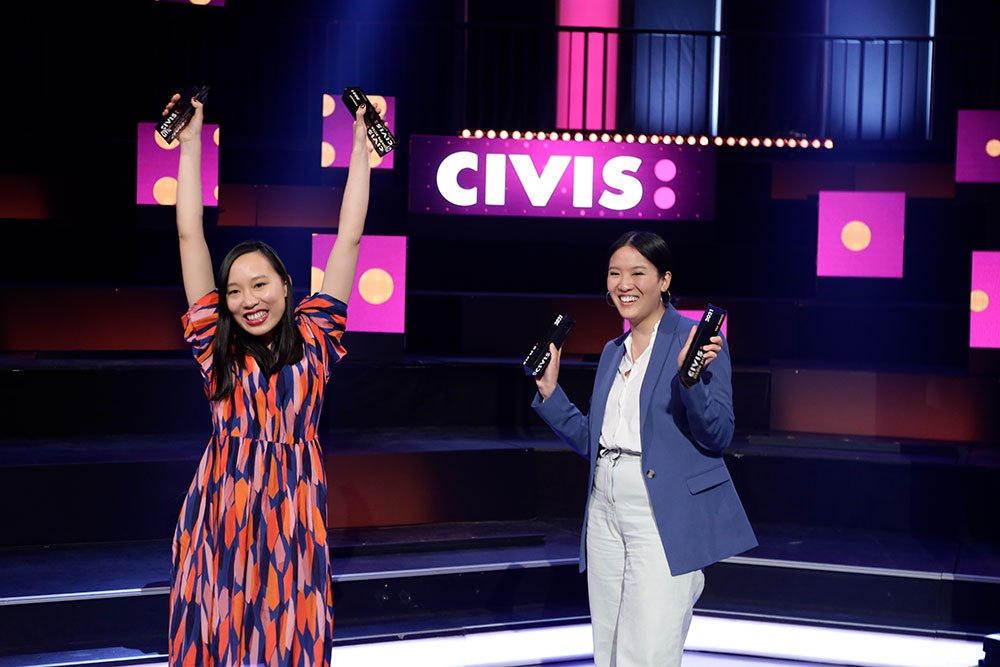
Against the logic of hatred and vengeance
All are visible moved by the winner in the AUDIO SHORT category , „It’s Just Words We’re Left With“ („Uns bleiben nur die Worte“), those present in the studio, laudator veteran German soccer international Gerald Asamoah, and even the award-winning author Sabine Wachs. Her report tells the story of two fathers who lost their children in the terrrorist bloodbath of November 13, 2015 in the Paris concert hall Bataclan. One father lost his daughter, who was among the victims. The other lost a son, who was one of the attackers. But the two refuse to enter the logic of hatred and vengeance. They listen to one another and realize: They are both bereaved. „How much courage and empathy these fathers need to have to open up in that way“, Asamoah marvels.
The TOP Award, „the prize of all CIVIS prizes“ (Abdul Karim), goes to the winner in the Podcast category: „Rice and Shine: Hamburg 1980 – when right-wing terrorism flared up again“ („Rice and Shine: Hamburg 1980 – Als der rechte Terror wieder aufflammte“). 40 years have passed since two young Vietnamese men were killed in an arson attack on a home for refugees in Hamburg. It was the first ever racist murder case in the history of the Federal Republic – and it has long disappeared from public awareness. „How can that be?“, asks TV presenter Dunja Hayali, presenting this year’s double winner. Vanessa Vu and Minh Tu Tran have reconstructed the assault and describe how the mother of one victim is fighting for some sort of memorial. It might still happen, thanks to the reminder by „Rice and Shine“: The two film makers donate the 15,000 euros in prize money to the memorial initiative.
CIVIS is moving on in testing times and „because we have to demonstrate how important is immigration“, says Deutsche Welle Director-General Peter Limbourg. The prizes do work because – in the words of SRF/SSR Director-General Gilles Marchand – they promote „respect for heterogeneity, for being different“. And, adds Deutschlandradio Director-General Stefan Raue, CIVIS is an option for all committed to this task „to engage and exchange on these issues.“
Header: WDR/ Dirk Borm
Photos: CIVIS Media Foundation / WDR / Dirk Borm

